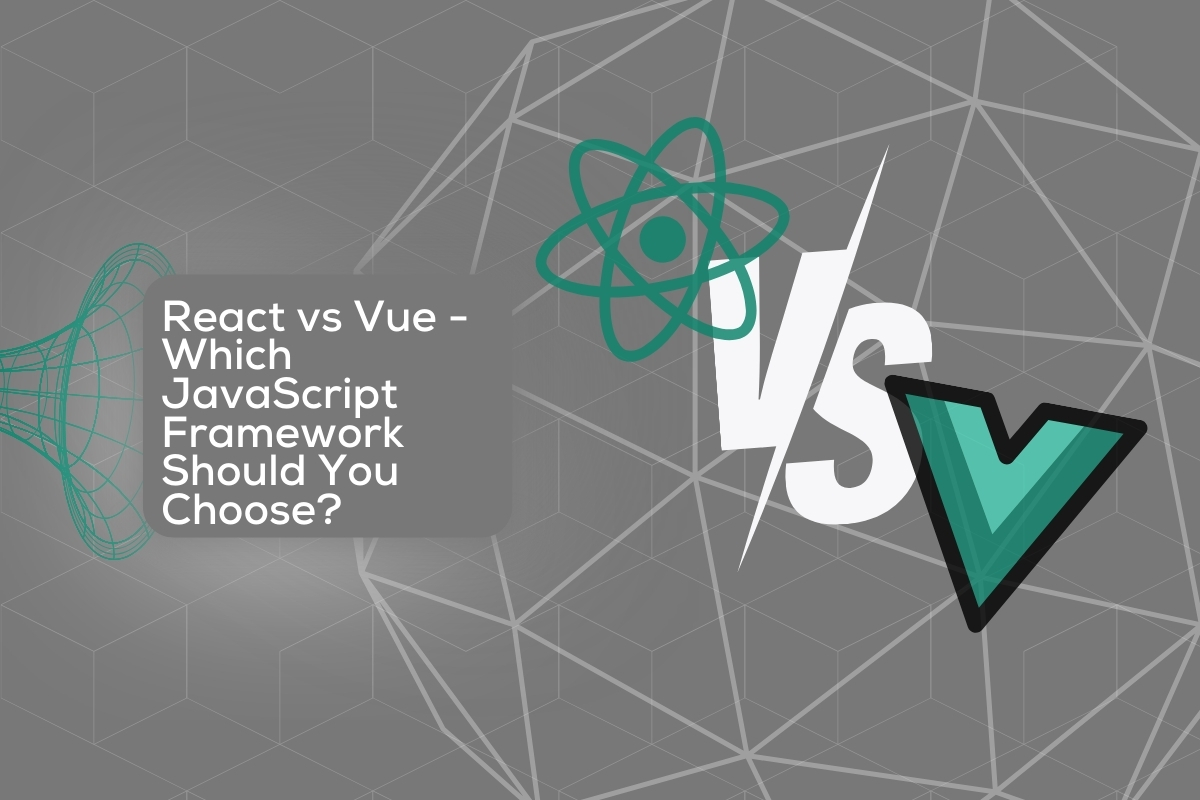One of the hot topics that still remains in the development world is the debate between React vs. Vue. As two of the most popular JavaScript frameworks, each offers unique features and capabilities that can significantly impact the success of your project. Here are some insights that will help you decide which one is right for your next developing project.
A Little Background Check on React
React is an open-source JavaScript library that has been a game-changer in the realm of web development ever since its beginning by Facebook developers in 2013. It is designed to create user interfaces.
React makes it easy for both mobile and desktop application development and developers to create reusable custom components. With its unique approach to the virtual DOM enhancing performance, the web pages are efficiently made and with faster loading.

A Short Overview of Vue.js
Vue, envisioned by Evan You, emerged as a lighter and more flexible JavaScript framework after his experiences working with AngularJS at Google. Officially released in 2014, Vue was developed to extract the best aspects of Angular and create something more accessible and versatile. This is especially important for MVP software development since you basically need a lightweight and fast front-end web development.
Its simple use and progressive nature allow smooth integration and adaptation within projects without compromising your fundamental features. The mobile app development trends are rapidly changing, so it’s no wonder developers need a clean and easy framework.

Why Are These Two Frameworks Some of the Top Used Options?
Vue.js and React.js stand out in the modern desktop application development services. In fact, they stand as top-tier JavaScript technologies known for their speed and flexibility. This efficiency stems from their ability to minimize server-side processing, optimizing the use of browser features and resources instead. They enhance the user experience by delivering content swiftly, fetching only the necessary elements.
Both frameworks facilitate the creation of intricate applications and functionalities through the use of templates. They also offer versatility for a diverse range of projects, so no wonder why 16.38% of developers use Vue and 40.58% use React.
Top-notch app development services use these frameworks, too. It’s not just because they are robust. React.js offers a wide selection of libraries and templates, and Vue.js uses the same component logic throughout the whole UI design process.

React vs. Vue.js – A Detailed Comparison of Each
Comparing Vue.js vs. React, they both have distinct features and capabilities. The choice between these often comes down to the specific requirements of the project and the developer’s familiarity with the framework. Let’s check them out.
Performance
React is known for its high performance, thanks to its virtual DOM and efficient update mechanism. This makes React suitable for complex, dynamic web applications. Vue.js offers similar virtual DOM implementation and impressive performance, especially in scenarios where real-time data binding is crucial. Both frameworks ensure a smooth user experience by minimizing direct DOM manipulation.
Flexibility
Vue.js is known for its flexibility and ease of understanding, making it a great choice for projects where quick development and adaptability are key. React, on the other hand, offers a wide range of libraries and tools, allowing developers to build highly customized solutions.
Market Position
React, backed by Facebook, holds a strong position in the market with widespread adoption in the tech industry. Vue.js, while smaller in market share, has been gaining traction rapidly, especially among startups and smaller projects, due to its ease of use and gentle learning curve.
Scalability
React’s component-based architecture lends itself well to scalability, making it a suitable choice for large-scale applications. Vue.js, with its modular development approach, also scales effectively, although it is more commonly associated with smaller to medium-sized projects.
Mobile Development
React’s sister framework, React Native, allows for the development of native mobile applications using the same React principles, making it a popular choice for mobile app development. You can also use Vue.js, primarily through integrations with frameworks like NativeScript, although it’s not as directly associated with mobile development as React Native.
Application Size
React apps are slightly larger due to the necessity for additional libraries. Vue.js, known for its lightweight nature, generally results in smaller application sizes, which can be beneficial for performance, especially in environments where network conditions are a concern.
Popularity and Community
Many front-end web development services use React (69% of developers, to be exact). It boasts a larger community, extensive resources, and widespread industry adoption, partly due to its backing by Facebook. Vue.js, while having a smaller community, has a rapidly growing user base and is widely appreciated for its comprehensive documentation and ease of use.

Where Is Each Framework Used For?
Comparing VueJS vs. React, you get that JavaScrip is one of the top programming languages. With some amazing examples of big and popular enterprises using these frameworks, you can get the bigger picture of how popular they actually are. So, here are some examples.
Popular Web Applications Built With React
React.js, created by Meta, is primarily utilized in social media applications. Major platforms such as Facebook, Instagram, and WhatsApp have been developed using React.js, showcasing its effectiveness in this domain.
Popular Web Applications Built With Vue
Vue.js stands out as the preferred choice for building single-page web applications. Its popularity extends to numerous large corporations that have integrated Vue.js into their JavaScript web solutions. Notable examples of platforms utilizing Vue.js include:
- Trivago,
- Nintendo,
- Adobe Portfolio,
- Apple,
- Google,
- Trustpilot,
- GitLab,
- Behance,
- Oval,
- Laravel Spark,
- Grammarly.
So, What’s Your Choice? Let Juratech Solutions Help You With Desktop and Mobile App Development Services
It’s clear that selecting the right framework – whether it’s React or Vue – depends largely on your specific project needs and goals. As an MVP development company, Juratech Solutions is dedicated to guiding you through this crucial decision-making process.
Our expertise in desktop and mobile app development services will deliver tailored solutions that align with your vision. Don’t hesitate to contact us for a consultation and to explore how we can turn your app idea into a reality.







